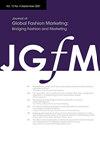Actual versus ideal self: An examination of the impact of fashion self congruence on consumer’s fashion consciousness and status consumption tendencies
IF 3.3
Q2 BUSINESS
引用次数: 15
Abstract
ABSTRACT With growing awareness about the self, consumers are increasingly becoming conscious of the role of fashion clothing in enhancing and communicating their self-image. They seek to portray their self-image through an outward display of fashion style that is congruent to their concept of self. Consumer’s congruity however can be formed with both actual and ideal self. Recognizing this fact, the present study investigates the comparative impact of actual and ideal-fashion self-congruity on fashion consciousness and status consumption tendencies of millennials in India. The study also probes into the mediating role of fashion consciousness between the relationship of actual/ideal fashion self-congruity and status consumption. Using a sample of 751 millennials, the study confirms that ideal fashion self-congruity is a stronger predictor of fashion consciousness and status consumption in comparison to actual fashion self-congruity. In fact, actual fashion self-congruity did not have any significant impact on the two dependent variables. Additionally, the results of the study also point towards the mediating role of fashion consciousness between the relation of ideal fashion self-congruity and status consumption. The study points towards some notable implications for marketers of branded fashion wear by signifying the importance of the ideal-self in consumer decision-making process.现实自我与理想自我:时尚自我一致性对消费者时尚意识和身份消费倾向影响的研究
摘要:随着人们对自我意识的增强,消费者越来越意识到时尚服装在提升和传达自我形象方面的作用。他们试图通过与自我概念一致的时尚风格的外在展示来描绘自己的自我形象。然而,消费者的一致性既可以与现实自我形成,也可以与理想自我形成。认识到这一事实,本研究调查了现实和理想时尚自我一致性对印度千禧一代时尚意识和地位消费倾向的比较影响。本研究还探讨了时尚意识在现实/理想时尚自我一致性与身份消费关系中的中介作用。该研究以751名千禧一代为样本,证实理想的时尚自我一致性比实际的时尚自我统一性更能预测时尚意识和地位消费。事实上,实际时尚自我一致性对这两个因变量没有任何显著影响。此外,研究结果还指出了时尚意识在理想时尚自我一致性与身份消费之间的中介作用。该研究指出,理想自我在消费者决策过程中的重要性,对品牌时尚服饰的营销人员有一些显著的启示。
本文章由计算机程序翻译,如有差异,请以英文原文为准。
求助全文
约1分钟内获得全文
求助全文
来源期刊

Journal of Global Fashion Marketing
BUSINESS-
CiteScore
6.90
自引率
31.60%
发文量
34
期刊介绍:
The Journal of Global Fashion Marketing is a quarterly journal that publishes peer-reviewed conceptual and empirical papers and business cases of original works that significantly contribute to the overall advancement of marketing theory, research, and practice in fashion, design, and culture. JGFM endeavors to be a “global bridge” connecting marketing scholars and practitioners in fashion, design, and culture throughout the world. We publish high-quality scholarly articles on marketing written by contributors representing the leading academic authors. As we state on the cover of every issue, our positioning statement, our value added to the marketing scholar readership, is truly to “Bridge Fashion and Marketing” 1. Monitor and analyze global fashion marketing trends. 2. Generate and integrate new ideas and theories related to fashion, luxury, and culture marketing theory and practice. 3. Apply new research methods and techniques in fashion, luxury, and culture marketing. 4. Explore and disseminate cutting edge fashion marketing practices. JGFM welcomes manuscripts that provide fresh, innovative insight to any topic in the field of fashion, luxury, and culture marketing. Both conceptual and empirical works are valued, so long as the manuscript addresses substantive issues in marketing.
 求助内容:
求助内容: 应助结果提醒方式:
应助结果提醒方式:


